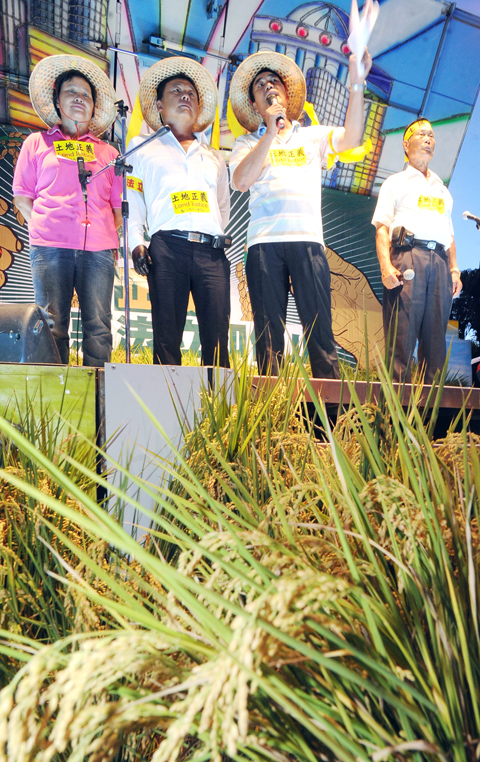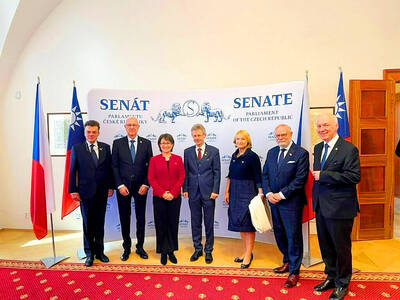There was music and cries, laughter and tears, placards and banners as more than 2,000 people — including farmers, farming activists and their supporters — protested on Ketagalan Boulevard in front of the Presidential Office last night, voicing their opposition to a series of recent land takeovers by the government.
“Farmers from Dapu [大埔], raise your hands! Farmers from Wanbao [灣寶], raise your hands! Farmers from Erchongpu [二重埔], raise your hands! Farmers from Jhubei [竹北], raise your hands! Farmers from Siangsihliao [相思寮], raise your hands! Farmers from Tucheng [土城], raise your hands!” called out Taiwan Rural Front spokeswoman Tsai Pei-hui (蔡培慧).
The farmers raised their hands as their village was called, while the rest of the crowd cheered and applauded.

PHOTO: WANG MIN-WEI, TAIPEI TIMES
Farmers from Dapu Borough in Jhunan Township (竹南) and Wanbao Borough in Houlong Township (後龍), both in Miaoli County, Jhubei City (竹北), Erchongpu in Hsinchu County's Jhudong Township (竹東), Siangsihliao in Changhua County's Erlin Township (二林) and Taipei County’s Tucheng (土城), gathered in front of the Presidential Office last night as all these communities have faced, or may be facing, land expropriation by the government in order to make way for various development projects.
Although farmers across the country have been fighting land expropriation for years, their campaign did not gain much public attention until the Miaoli County Government last month sent in excavators escorted by police to dig up rice paddies in Dapu.
Images and video clips of what took place in Dapu were quickly spread via the Internet and media outlets, shocking the public.
“The government is not protecting our interests as it should be, instead it only cares about the interests of large corporations,” Erchongpu farmer Liu Ching-chang (劉慶昌) told the crowd. “One village alone is not powerful enough, we farmers across the country must stand in solidarity to fight for our rights.”
Dozens of civic groups joined the farmers in their struggle.
“I feel sad to be here today, seeing how these farmers are suffering,” Losheng Self-Help Association chairman Lee Tien-pei (李添培) said. “The police surrounded Dapu and destroyed the farms, just like how the police surrounded Losheng Sanatorium and demolished buildings two years ago.”
The Losheng Sanatorium was built in the 1930s in Taipei County to isolate patients with Hansen's disease, more commonly known as leprosy. A large part of the sanatorium campus was flattened to make way for a mass rapid transit maintenance depot despite a years-long campaign against the plan.
Former Council of Agriculture minister Tai Chen-yao (戴振耀), who is also a long-time farmers’ rights activist, was in the crowd.
“The land expropriations nowadays are the same as they were decades ago, the government's mentality has never changed,” he said. “They think industry is better than agriculture in terms of production value, but they’re not factoring in farmers’ rights to survival, to live and to work, as well as the positive contributions of farms to the environment.”
Some people in cars that drove by cheered for the farmers, while donations continued to pour in.
“I’ve donated NT$2,000 because I think farmers are suffering too much, they shouldn't be treated this way,” a woman said right after putting in two NT$1,000 bills into the donation box.
A number of bands and artists also expressed their support through their performances.
The demonstrators stayed out overnight on Ketagalan Boulevard.

FREEDOM OF NAVIGATION: The UK would continue to reinforce ties with Taiwan ‘in a wide range of areas’ as a part of a ‘strong unofficial relationship,’ a paper said The UK plans to conduct more freedom of navigation operations in the Taiwan Strait and the South China Sea, British Secretary of State for Foreign, Commonwealth and Development Affairs David Lammy told the British House of Commons on Tuesday. British Member of Parliament Desmond Swayne said that the Royal Navy’s HMS Spey had passed through the Taiwan Strait “in pursuit of vital international freedom of navigation in the South China Sea.” Swayne asked Lammy whether he agreed that it was “proper and lawful” to do so, and if the UK would continue to carry out similar operations. Lammy replied “yes” to both questions. The

Two US House of Representatives committees yesterday condemned China’s attempt to orchestrate a crash involving Vice President Hsiao Bi-khim’s (蕭美琴) car when she visited the Czech Republic last year as vice president-elect. Czech local media in March last year reported that a Chinese diplomat had run a red light while following Hsiao’s car from the airport, and Czech intelligence last week told local media that Chinese diplomats and agents had also planned to stage a demonstrative car collision. Hsiao on Saturday shared a Reuters news report on the incident through her account on social media platform X and wrote: “I

SHIFT PRIORITIES: The US should first help Taiwan respond to actions China is already taking, instead of focusing too heavily on deterring a large-scale invasion, an expert said US Air Force leaders on Thursday voiced concerns about the Chinese People’s Liberation Army’s (PLA) missile capabilities and its development of a “kill web,” and said that the US Department of Defense’s budget request for next year prioritizes bolstering defenses in the Indo-Pacific region due to the increasing threat posed by China. US experts said that a full-scale Chinese invasion of Taiwan is risky and unlikely, with Beijing more likely to pursue coercive tactics such as political warfare or blockades to achieve its goals. Senior air force and US Space Force leaders, including US Secretary of the Air Force Troy Meink and

Czech officials have confirmed that Chinese agents surveilled Vice President Hsiao Bi-khim (蕭美琴) during her visit to Prague in March 2024 and planned a collision with her car as part of an “unprecedented” provocation by Beijing in Europe. Czech Military Intelligence learned that their Chinese counterparts attempted to create conditions to carry out a demonstrative incident involving Hsiao, which “did not go beyond the preparation stage,” agency director Petr Bartovsky told Czech Radio in a report yesterday. In addition, a Chinese diplomat ran a red light to maintain surveillance of the Taiwanese